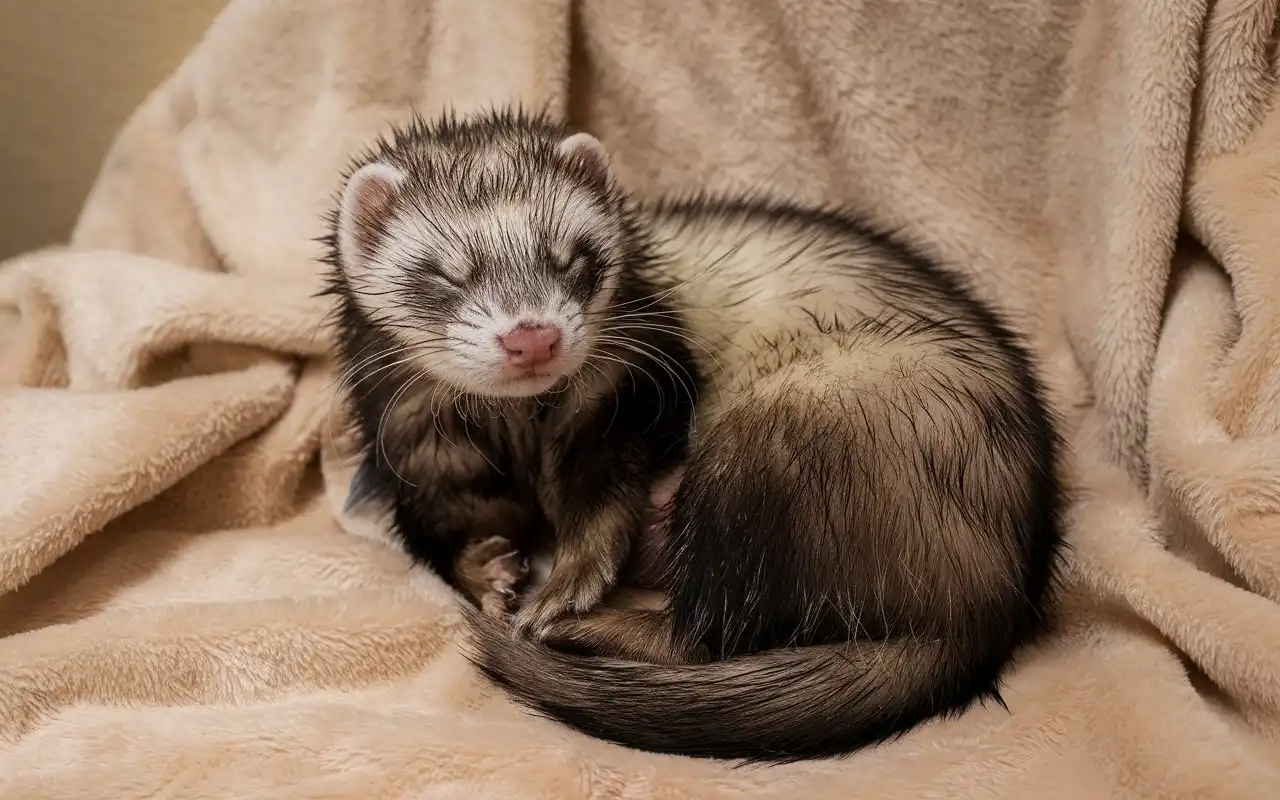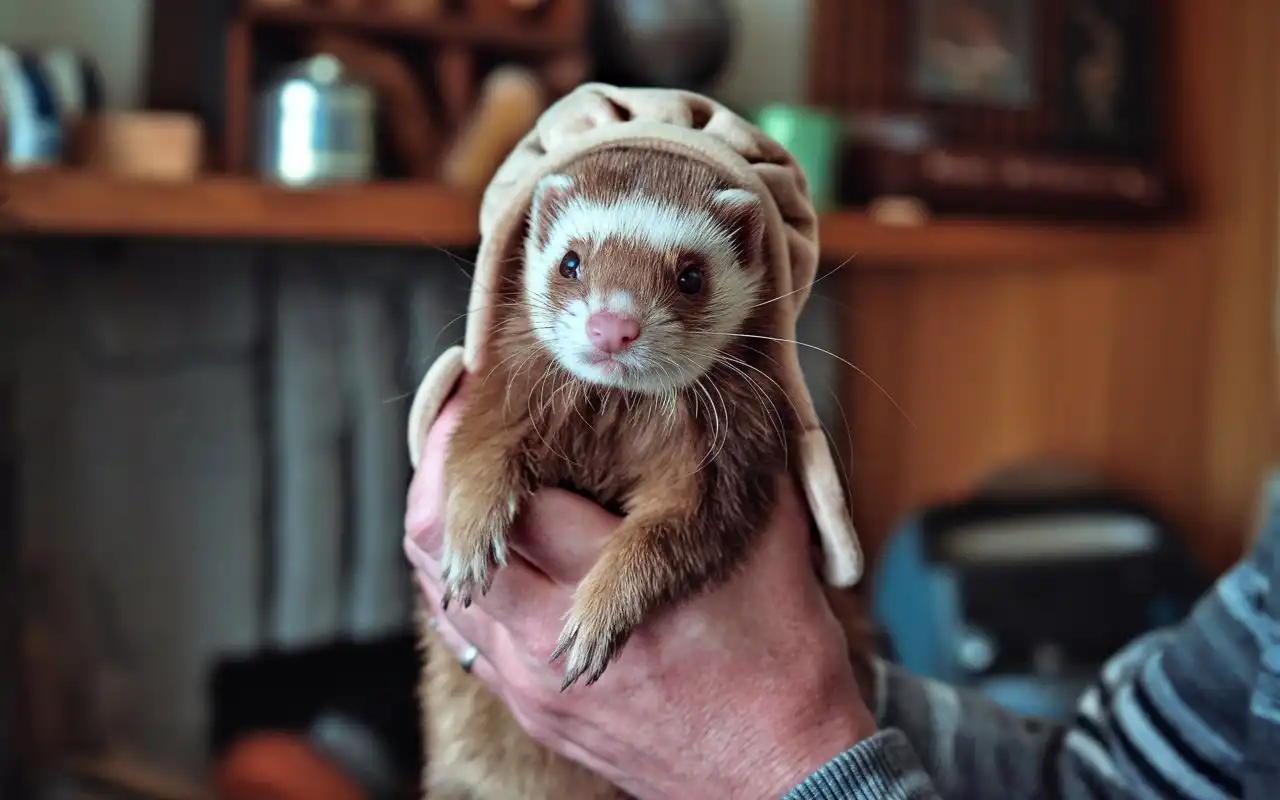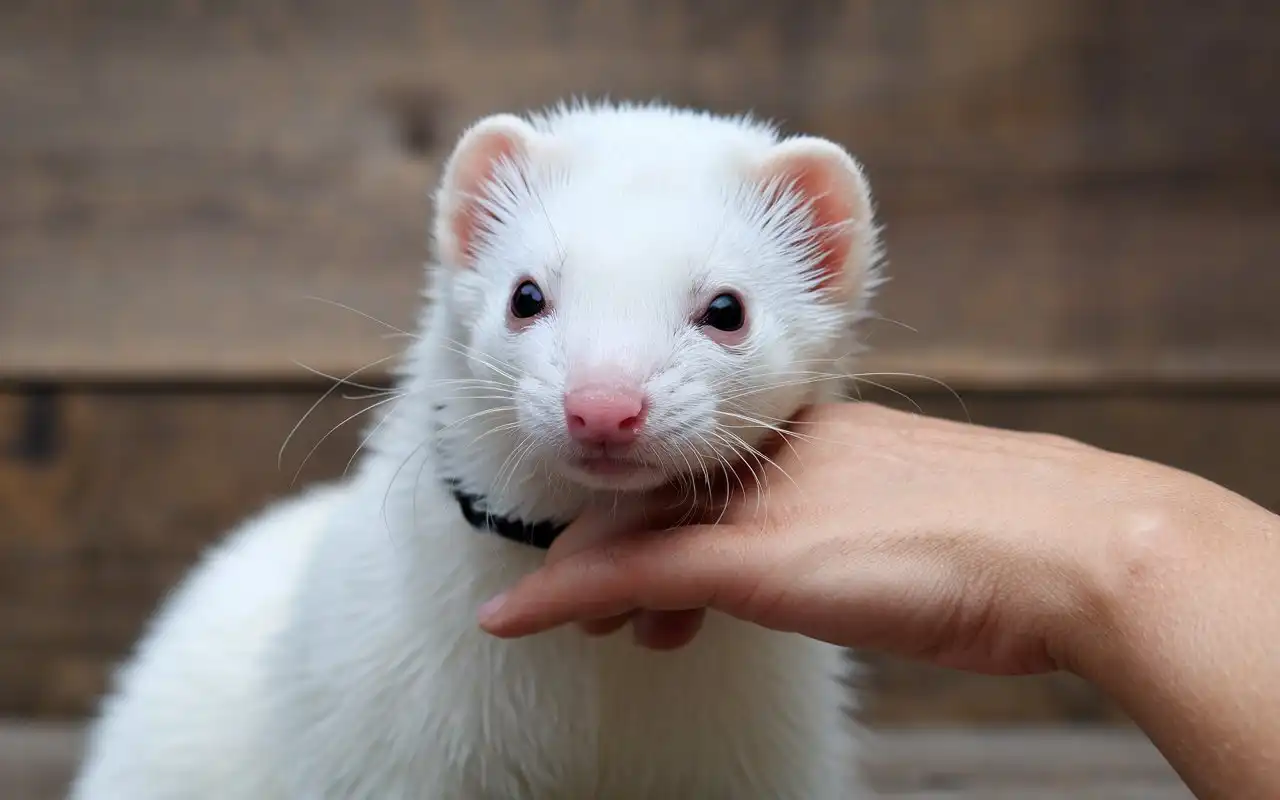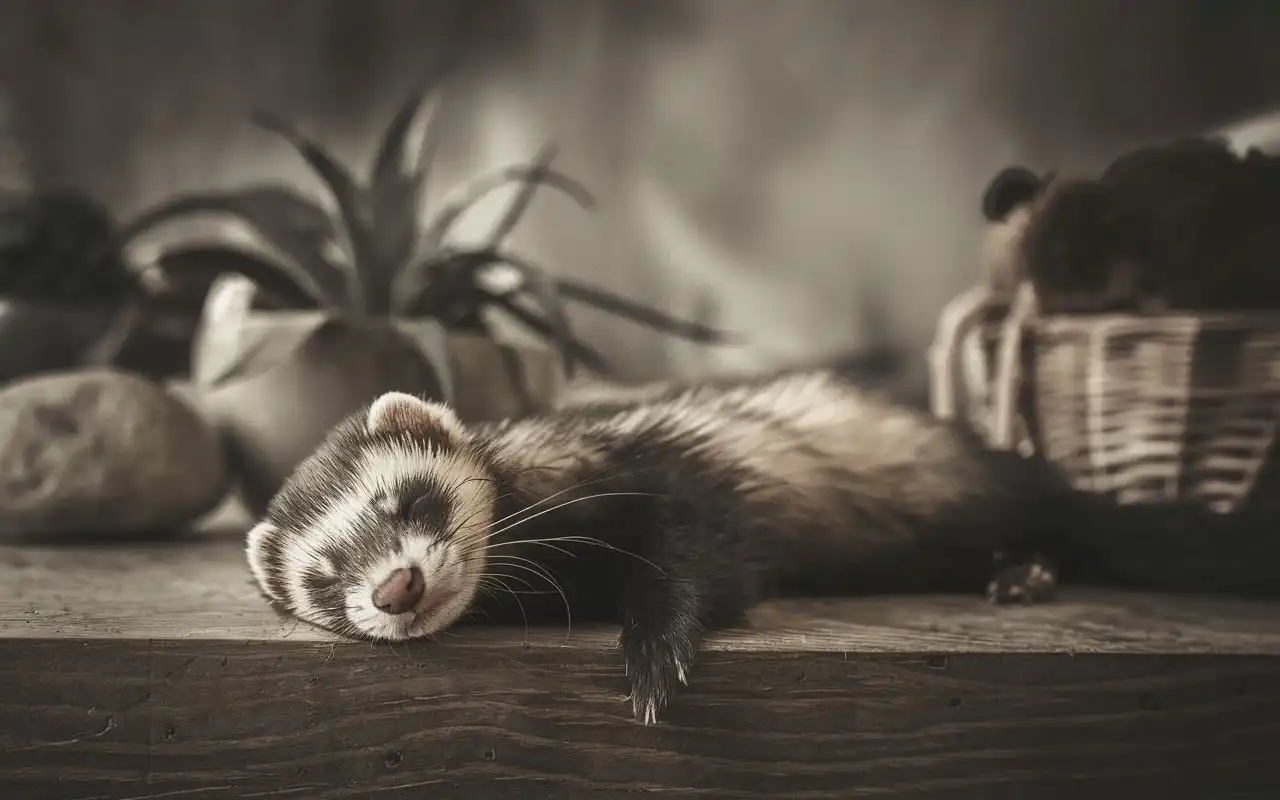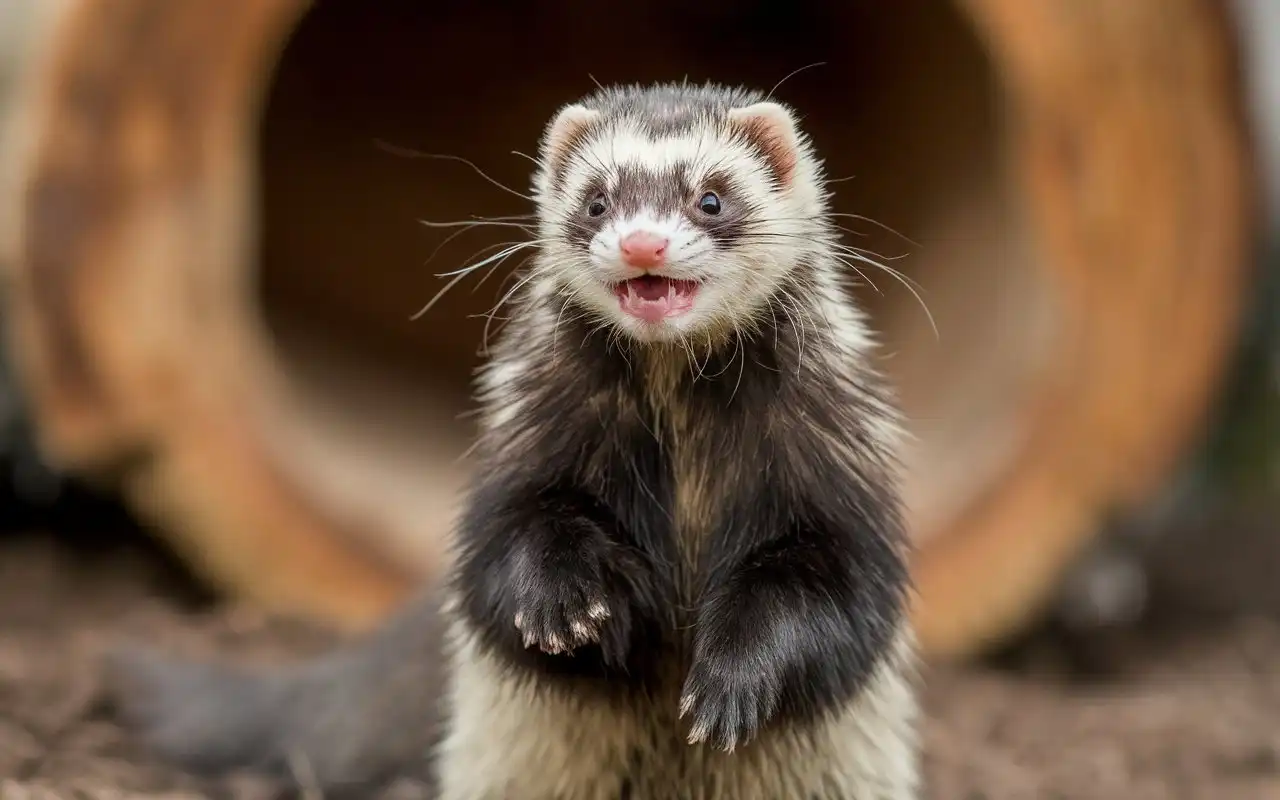Many pet owners may not know the term Down Syndrome Ferret. But, it has intrigued fans of these curious little creatures. Ferrets cannot have Down Syndrome like humans do. But, some ferrets show traits that mimic its symptoms. Knowing these traits can help owners care for and appreciate their unique pets.
Table of Contents
What is a Down Syndrome Ferret?
A “Down Syndrome Ferret” is a term for ferrets that show traits like those in humans with Down Syndrome. Ferrets cannot have Down Syndrome. They lack the same chromosomes as humans. Instead, pet owners have popularized this term. They notice some differences in their ferrets. They have unique faces and developmental delays. They may be shorter, have a unique head shape, or learn new skills more slowly. The term can be misleading. But, it shows pet owners’ curiosity about their ferrets’ health. This has led to a growing interest in understanding these unique pets’ special needs.



Understanding the Genetic Differences in Ferrets
To appreciate why ferrets can’t have Down Syndrome, you must know their genetics. Ferrets have a different set of chromosomes than humans. They lack the trisomy that causes Down Syndrome (an extra copy of chromosome 21). In humans, this extra chromosome affects growth, cognitive abilities, and facial characteristics. Ferrets have genetic variations that can affect their appearance and behavior. Genetic mutations or inherited traits can sometimes cause deformities or delays. They may resemble Down Syndrome symptoms. This genetic difference is crucial. It explains why some ferrets, though similar, may differ in their traits.
Characteristics of Down Syndrome Ferrets
Physical Traits
Ferrets with “Down Syndrome” may have some unusual physical traits. These traits could include a broader, flatter head, a smaller size than typical ferrets, and less defined features around the nose and jaw. Some may have eyes that look more widely spaced or misaligned. Such traits often mislead people to think of Down Syndrome. They can resemble the faces of those with the condition. Despite these differences, many of these ferrets are happy. They live fulfilling lives if they get the care and attention they need.
Behavioral Differences
Ferrets with traits like Down Syndrome may show some behavior issues. They may respond slowly to stimuli, learn slowly, and be more passive. They may be less active than other ferrets. They prefer calm activities and slow play. This can result from developmental delays. They can affect motor skills or cognitive processing. Ferret owners often note that these pets take longer to adjust to new places or commands. However, they still enjoy engaging with their surroundings in their own way. We must understand these behavioral differences. It’s key to creating a safe, comfortable environment for the ferrets.
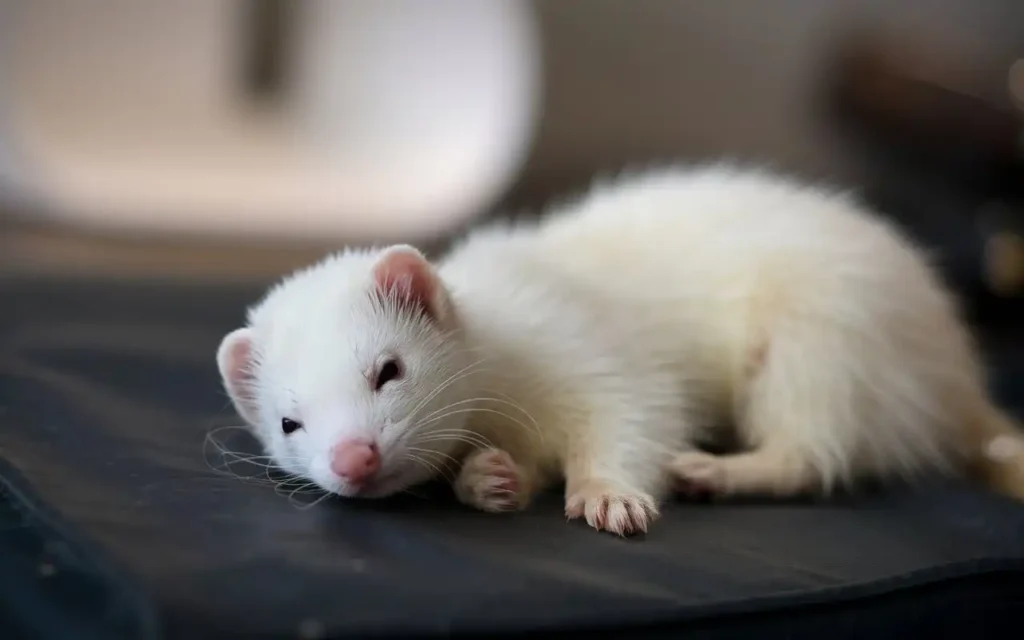
Can Ferrets Really Have Down Syndrome?
Explanation of Down Syndrome in Humans
Down Syndrome is a genetic condition. It occurs when a person has an extra copy of chromosome 21, for a total of 47 chromosomes. This extra genetic material affects development. It causes the condition’s features and delays. The condition is unique to humans. It involves the human chromosome arrangement. So, just because a ferret acts like a human, it doesn’t mean it has Down Syndrome. Its genes are very different. Down Syndrome is a human condition. So, it cannot apply to ferrets or any non-human species.
Similarities in Symptoms Between Ferrets and Down Syndrome
Ferrets can’t have Down Syndrome. However, some symptoms, like poor coordination and odd features, may resemble it in humans. For example, ferrets with delays may be clumsy. They may respond slowly to training or struggle to interact with their environment. These symptoms often stem from genetic mutations or inbreeding, not an extra chromosome. The resemblance is purely coincidental and stems from a misunderstanding of ferret genetics. But this similarity drives many pet owners to seek info on their unique needs.
Why Ferrets Appear to Have Down Syndrome
Unique Genetic Conditions in Ferrets
Ferrets have genetic conditions that can cause physical and developmental differences. These can make them resemble animals with Down Syndrome-like traits. One such condition is Waardenburg Syndrome. It affects pigmentation and can cause hearing loss. It gives ferrets a distinct look. These conditions are often hereditary. They can change one’s appearance, such as a wider skull or a slightly altered gait. Owners may assume their ferret has a form of Down Syndrome due to such traits. However, it is not biologically possible.
Common Misconceptions About Ferret Health
There is often confusion about ferret health and development. This is especially true when owners see unusual traits. For example, many might mistake poor coordination for signs of cognitive impairment, like that seen in Down Syndrome. However, many of these traits can be attributed to other factors, such as age, diet, or general health conditions that are common among ferrets. Understanding ferret development can help owners care for their pets. They can also respond to any individual needs.
Health Issues in Ferrets with Down Syndrome Traits
Mobility Issues
Ferrets with developmental challenges often face mobility issues. This can include difficulties in climbing, navigating complex spaces, or maintaining balance. Such challenges can be worse due to their smaller size or changed body. It makes it harder for them to move as freely as other ferrets. For these ferrets, provide a space that minimizes obstacles. It should have soft bedding to cushion any falls. A simple, accessible environment can greatly improve their quality of life. It will help them move with more ease and confidence.
Vision and Hearing Impairments
Many ferrets with traits like Down Syndrome may have vision or hearing impairments. This could stem from genetic conditions or developmental anomalies. They affect the sensory organs and impair vision or hearing. Such impairments may slow their reactions to environmental changes. They may also seem less responsive to their owner’s voice. For these ferrets, a gentle touch and a fixed layout help them navigate their space better. Meeting these sensory needs creates a safer, more comfy place for these unique pets.
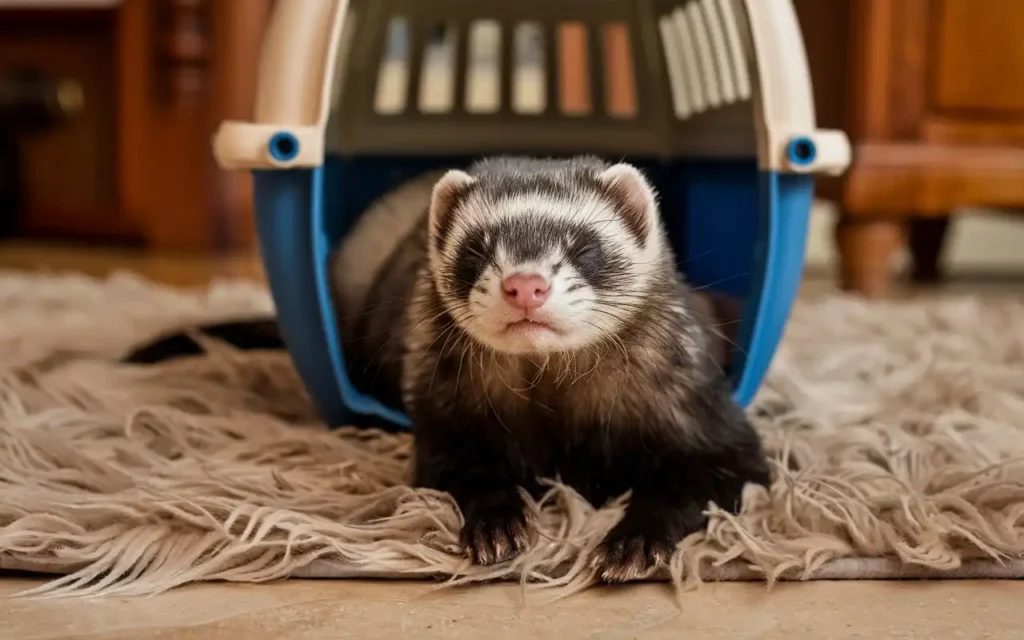
Caring for a Down Syndrome Ferret
Special Dietary Needs
Caring for a ferret with special needs involves paying close attention to their diet. All ferrets need a high-protein, high-fat diet. But those with Down Syndrome-like traits may need extra growth and energy supplements. High-quality ferret kibble is rich in animal-based proteins. It can help maintain their muscle mass and support their health. Some owners may consider adding small amounts of fresh meat to their diet. They must ensure it is balanced and meets the ferret’s health needs. Regular consultation with a vet can help in tailoring the diet to address any unique needs.
Creating a Safe Environment
A safe environment is key to the well-being of ferrets with developmental challenges. This means making their home safe from hazards that could cause injury. These include steep stairs, high ledges, and areas where they might get trapped. Soft bedding, food and water dishes, and ramps can help a ferret with mobility issues. Also, a calm, quiet space can help overstimulated ferrets. A good environment keeps them safe. It also provides comfort and stability.
Veterinary Care for Down Syndrome Ferrets
Regular Veterinary Care
Like any pet, ferrets with Down Syndrome-like traits need regular vet care. It is vital for their health. It’s vital to find a vet experienced with exotic pets, especially ferrets. They will better understand the unique challenges these animals face. Regular check-ups can monitor their weight, mobility, and behavior. Changes could signal a health issue. Vaccinations, parasite prevention, and dental care are vital to a ferret’s health. Also, these ferrets may have genetic issues. So, discuss any special needs or symptoms with the vet. This approach helps catch problems early. It allows for better health management over time.
Socializing a Special Needs Ferret
Socialization is crucial for any ferret. It requires extra care and patience for those with Down Syndrome-like traits. These ferrets may be anxious in new places and around strangers or other pets. To help them feel more secure, gradually introduce new experiences. A predictable routine will also help. Owners can start by letting the ferret explore a small, safe space. They can then expand the area as its confidence grows. Gentle handling and positive reinforcement during playtime can also encourage social interaction. Respect their pace. Provide familiar, comforting objects to ease anxiety. Building a strong bond with a special needs ferret takes time. But, it’s incredibly rewarding as they begin to trust and interact more.
Best Toys and Activities for Down Syndrome Ferrets
Interactive Toys
Engaging toys are key to keeping a special needs ferret active and alert. Toys like tunnels, balls, and soft chew toys are great. They let them play within their physical limits. Puzzle toys that dispense treats can stimulate a ferret’s mind. They reward exploration, even if the ferret moves slowly or cautiously. Soft, plush toys are best. They are gentle on sensitive teeth and jaws. They provide comfort and entertainment. For ferrets with mobility issues, place toys in easy-to-reach spots. This lets them enjoy playtime without straining themselves. Choosing toys that match their energy and skills is vital for their well-being.
Creating Safe Play Areas
Creating a safe play area is essential for ferrets with Down Syndrome-like traits. It should be free of sharp edges, narrow spaces, and small objects that could pose a choking hazard. Utilize plush rugs or floor coverings to soften any tumbles. These ferrets may struggle to balance. A contained play area keeps them from unsafe zones, like stairs and electrical cords. This play space can bring them joy and exercise. It lets them explore and engage with their environment at their own pace. Owners can enhance the area with small tunnels and hideaways. Low ramps can provide safe exploration options.
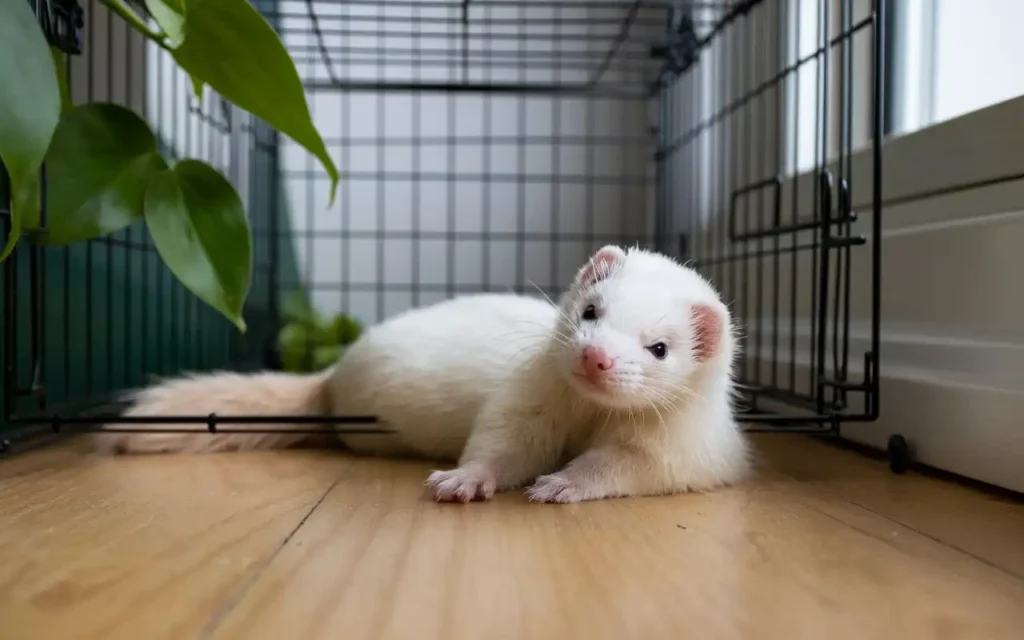
Challenges of Owning a Down Syndrome Ferret
Emotional Challenges for Owners
Owning a ferret with Down Syndrome-like traits can be tough. It requires more care, patience, and understanding. It’s hard to watch a pet struggle with mobility or senses. Their daily frustrations can be tough to see. Some owners may feel sad or frustrated. They compare their pet’s progress to that of other ferrets. However, we must focus on the unique joys of caring for these special animals. It includes seeing their small victories and the strong bond that grows over time. Support groups for ferret owners, online and offline, can help. They offer community and advice for those facing similar challenges.
Time and Financial Commitment
Caring for a special needs ferret takes a lot of time and money. Costs can rise from regular vet visits, specialized diets, and extra equipment like ramps or custom bedding. Also, these ferrets may need more attention. They are prone to injuries and health issues. Potential owners should check if they have the time and resources to care for a special needs ferret. However, for those who can commit, raising a ferret with Down Syndrome-like traits can be very fulfilling. It offers a unique bond that few other pets can match.
How to Find a Down Syndrome Ferret for Adoption
Adoption from Rescues and Shelters
Many special-needs ferrets, some with Down Syndrome-like traits, end up in rescues. These groups seek homes that can give extra care and love to these unique animals. Adopting from a rescue can be rewarding. It gives a second chance to a ferret that might be overlooked. Rescue centers can provide useful info on the ferret’s health and care needs. Before adopting, ask about the ferret’s temperament, mobility, and past treatments. This will help ensure a good match between the ferret’s needs and your ability to care for them.
Importance of Patience During the Adoption Process
Adopting special needs ferrets can take time. Rescues want to find the best homes for their animals. Patience and openness to a thorough vetting can improve adoption success. Prospective owners may need to share details about their home, past ferret experience, and plans for caring for a unique pet. This process may seem long. But, it’s to ensure a happy, healthy bond between the ferret and its owner. This patience often pays off. It can create a lasting bond with a ferret that might have been overlooked.
Understanding Special Needs in Ferrets
Ferrets with Down Syndrome-like characteristics can have unique needs compared to other ferrets. These may include challenges with vision, hearing, or mobility, and they may show different patterns in social behavior. Understanding these needs helps create a supportive environment for them. For instance, if a ferret’s vision or hearing declines, placing food and water in the same spots can help. It will make their routine easier. Gentle handling and speaking softly when approaching them can help prevent startling them. These small changes can greatly improve their daily lives. They will feel safe and cared for.
Common Myths About Down Syndrome Ferrets
A common myth is that ferrets can develop Down Syndrome in the same way humans do. However, ferrets and humans have different chromosomal structures. So, this condition doesn’t occur in ferrets as it does in humans. Instead, “Down Syndrome ferret” describes ferrets with similar symptoms. These include physical or cognitive challenges. This difference is crucial for potential owners. It shapes the care needed for these pets. It’s more productive to accept their uniqueness and focus on their needs. Comparing their traits to animals with similar human conditions is less useful.
The Role of Genetics in Ferret Health
Genetics greatly affect a ferret’s health and risk of developmental issues. There is no link between a ferret’s genetics and Down Syndrome. But, some genetic conditions can cause physical or behavioral differences. Breeding practices can sometimes cause congenital defects in offspring. So, potential owners must choose breeders carefully. Responsible breeding focuses on minimizing genetic issues and producing healthier ferrets. Owners can better prepare for health issues in their ferrets. This is by understanding the role of genetics in their pets’ health.
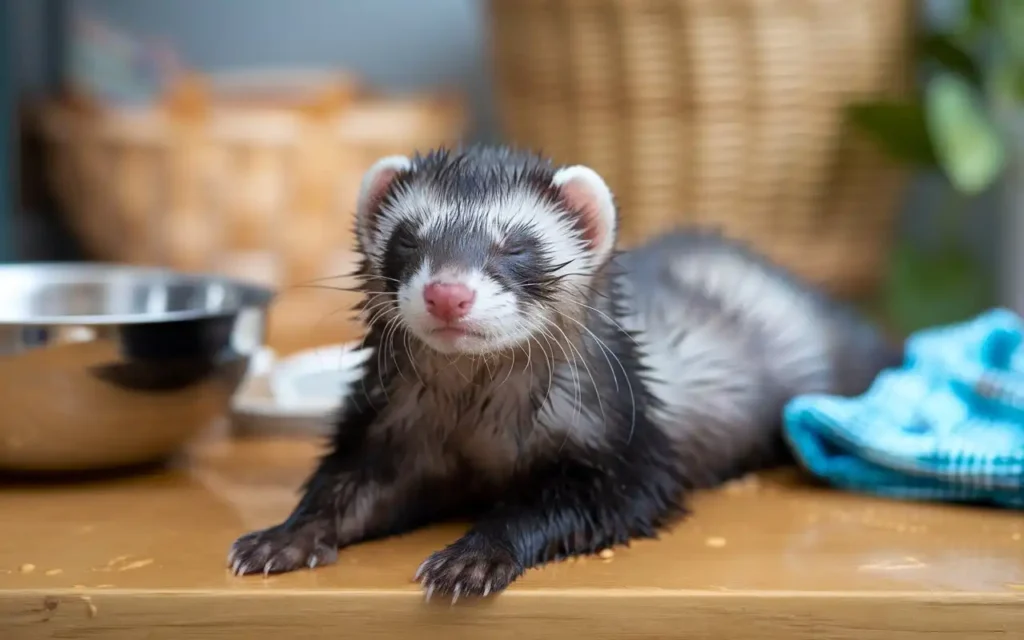
Conclusion
Caring for a ferret with Down Syndrome-like traits is a unique, challenging journey. But it also brings joy and a deep connection. These special needs ferrets can’t have Down Syndrome. But, they need extra care to thrive. Meeting their needs can greatly improve their quality of life. This includes dietary changes and a safe, engaging environment. Regular vet visits, patience, and some creative playtime can help. Owners can then ensure their ferrets live happy, fulfilling lives. For those who will try, the reward is a loyal, loving pet with a unique personality.

